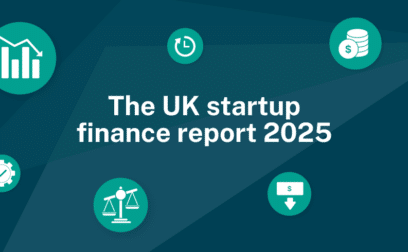AUTHOR: Stuart Pawelczyk, Head of Commercial Mortgages at Swoop
Away from the headlines, business owners need to know how to be strategic about their borrowing in the new economic landscape.
When big things happen in the economy, it’s too tempting to believe that either nothing can be done and what will be will be, or hope that outside help will arrive in time.
For business owners, neither of these approaches is helpful: you need to know how you will approach the new landscape. You may have to slow down, change direction, or transform to take advantage of the terrain.
Tomorrow’s winners are the people who make good decisions today.
Interest rates are going up, showing a level of volatility we haven’t seen in almost a generation. With this rate increase, business owners who are borrowing or are considering borrowing, must consider their options and what is available from the market. With the proliferation of lenders and products on the market, there are many possibilities beyond your own bank.
By understanding the wider market, you can know how your business will be affected, and what you can do about it.
There have been some panicking headlines – perhaps for good reason: increasing interest rates will result in higher loan repayments if you are borrowing at a variable rate (which most commercial mortgages and secured business loans are). If you are on a fixed rate, the news is better: your repayments will be protected against these rate rises for the agreed fixed interest rate period. Perhaps those most worried will be those approaching the end of their fixed rate period: on expiry, the market will look very different to the one when you took out your loan with substantially higher interest rates.
The end of cheap money?
As a result of the last recession, the UK has been in an usually prolonged period of low interest rates, giving business owners cheap debt. Bank of England Base Rate has averaged at 7.15% from 1971 until 2022, reaching an all time high of 17% in November 1979 and record low of 0.1% in March 2020.
Before the ‘Credit Crunch’ of 2008, Bank of England Base Rate was at 5% for a number of years meaning real pay rates on commercial mortgages and secured loans were typically 6.5%-8.75% when you include the lender margin above Bank of England Base Rate.
In the last month, interest rates have shot up, spooking a market that isn’t used to seeing such an unpredictable change. There has been a sharp and rapid readjustment in the market. We all knew that cheap debt forever was not a sustainable model, but few were emotionally prepared for the dam breaking this autumn.
What is the impact?
All of this will become a bit clearer if we put in some numbers:
Consider a commercial mortgage of £500,000 at an interest rate of 4% over 20 years.
Monthly capital and interest repayments will be around £3,030.
If we increase the interest rate by 2%, the new monthly repayments will be £3,582, a difference of £552 per month.
The increase seen in rates has come at a bad time, because it coincides with a period of high inflation and other costs, such as utilities, are hitting record highs. If you are a trading business, there are levers you can pull to limit this impact: you could increase your prices, or reduce other unnecessary costs.
Swoop has a strong focus on preserving cash flow for businesses: one of the things we can do is review existing loans to see whether there are routes to reducing monthly payments for customers.
For example, we’re currently working with a number of care home operators who have reviewed how much they charge for their service. Many of the most important numbers have changed, so their pricing structure needs to follow suit. The same goes for children’s day nurseries, pubs, shops and any other business selling a product or service.
You will probably have noticed that whether you’re paying for the weekly shop for your family or raw materials for your business, things are costing more at the point of sale.
Basic principles of borrowing
If you want to borrow smarter, there are a few things to consider.
First, the less you borrow, the lower the rate increase will impact you in real terms. This might sound basic, but it’s a good place to start with a review of how much you’ve borrowed (and why you’ve borrowed it).
Consider too that interest costs are tax deductible, unless you are a buy to let investor with properties owned in your personal name. If your business is well established and profitable, then these increases in rates are absorbed by cash flow relatively comfortably. If they are not, talk to Swoop about what solutions we can provide.
Fixed vs Variable: until recently, most lenders in the market offered only variable rates of interest that moved in tandem with the base rate. Now with a degree of volatility in the market, more lenders have begun to offer fixed rates. Throughout the period of cheap debt, borrowers tended to want variable rates to benefit from the lowest interest costs possible (as fixed rates are usually more expensive than variable rates when compared side by side). However, demand has been strong for fixed rates recently as it has become apparent that interest rates will rise.
In a time of volatility, there is something attractive about having a fixed rate and a fixed monthly repayment for an agreed period of time. But be cautious again before you move to a fixed rate: most lenders will have already factored in anticipated interest rate rises and set their fixed rates accordingly. If the rates drop again, you could be stuck with paying much more than you could be on a variable rate. Therefore, all business owners taking on a commercial mortgage or secured business loan should be asking themselves is now the right time to fix?
Each business is in a unique position and each borrower has a different appetite for risk. What you do next depends on where you are now, where you want your business to be and how much capacity you have to ride the waves of interest rates changes and inflation. Knowing all your options can help you make the right decision for your business – which is where Swoop fits into the picture.
Are you thinking about buying an existing business?
There are many advantages to buying an existing business: the loyal customer base and the established product are all attractive. But is now the right time to buy? Swoop’s experience here may help you.
Many of the owner occupied commercial mortgages we arrange for SMEs are to acquire businesses that include property. These include care homes, hotels, children’s day nurseries, pubs, dental practices, convenience stores, petrol stations, B&Bs, supermarkets and pharmacies, which all trade from real estate. Buying an existing business that is performing well, with a sensible level of borrowing (up to c.70% LTV against going concern value) will still be a highly profitable venture for entrepreneurs.
Taking a care home as an example, buying at £1.5m, the EBITDA will be around £230,000. A loan at 70% LTV will cost about £100,000 per annum to service (capital and interest over 20 years) based on current interest rates. This leaves the business owner a healthy surplus of £130,000 pa.
The lesson here is that if you have found the right business for you, don’t be put off buying because rates have increased.
Keep tabs on market changes
It can be tempting in times of turmoil to dig in and consolidate, but really this is no reason to delay growing your business or buying a new business if it is right for you. Now is a time to assess what options are available, speak to a professional who knows what is happening in the market and which lenders are active.
Swoop’s Commercial Mortgage Team is ready to help any business owner who has an ambition to make property part of their success story. Sign into your account to set up a call with one of the Team.


































 yet? Register here!
yet? Register here!